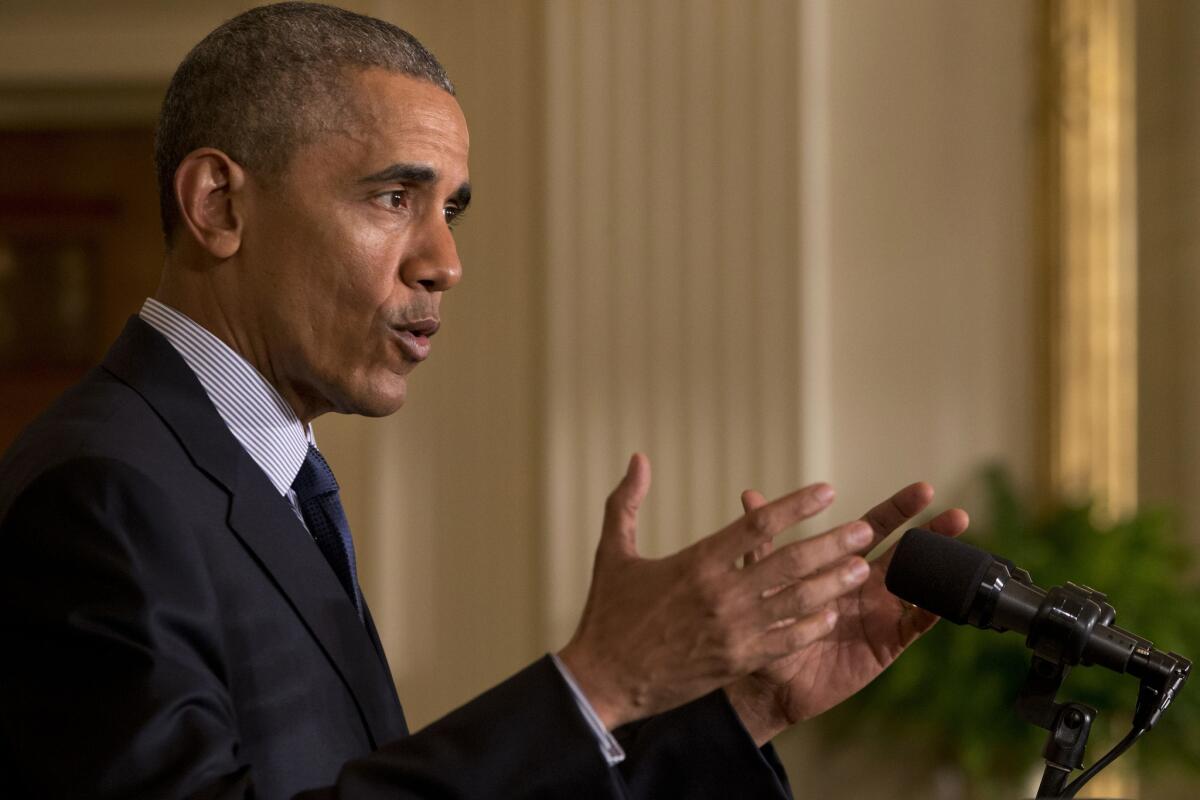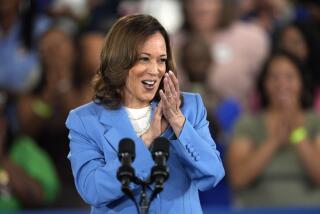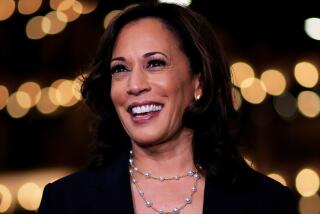Obama likely to sit out Democratic primary altogether, White House aides say

President Obama is expected to sit out the Democratic primary altogether in order to preserve party unity, according to senior White House advisors.
Reporting from Washington — President Obama is likely to sit out the entire presidential primary season amid concerns about the damage he could do by stepping too soon into a contentious Democratic contest running far longer than he expected.
Prominent fault lines have emerged in recent days in the Democratic race that threaten to permanently damage the party. But seeing no clear way for Obama to unify Democrats without alienating key voters, White House aides are gambling that the president will still have enough time to rally the party before the November general election even if both Democratic candidates stay in the race until the final primary votes are cast in June.
The risks are clear: If Obama jumped into the fray too early, he would jeopardize the loyalty of supporters of Vermont Sen. Bernie Sanders. He also stands to be accused of acting in the interests of the establishment so deeply resented by large swaths of the electorate this campaign cycle. Both could cost votes in November.
But as both the party’s leader and an outgoing president whose legacy relies so greatly on a Democratic successor, Obama must step in at some point if he is to prevent intraparty squabbling that can divide Democrats when unity is most crucial – amid a fiercely fought general election.
“As the leader of the party and as the incumbent two-term president who also happens to have among Democrats and independents the highest favorable and approval ratings of any national elected official, unity is important,” said David Simas, the White House political director. “So that’s guided the way we’ve thought about this.”
Election 2016 | Live coverage on Trail Guide | Track the delegate race | Sign up for the newsletter
Other Democratic leaders are largely lined up behind front-runner Hillary Clinton. She has the support of more than 450 super-delegates – elected officials and party bosses who can back the candidate of their choice – but Obama has, by tradition and practicality, stayed out of the race, not wanting to be seen as publicly influencing voters or trampling on the chances of lesser-known candidates, including Sanders, Clinton’s lone remaining rival.
While advisors won’t completely rule out a presidential endorsement in the primary, they say it is highly unlikely, at least until after the final primary votes are cast in June.
To be sure, Obama is working to help the party succeed in November even without endorsing. He raises money for party committees and has endorsed Democrats further down the ballot. Vice President Joe Biden has already begun campaigning with Democratic Senate hopefuls – even ones who are locked in competitive primaries with other Democrats.
Obama will also try to keep advancing policies that matter to Democratic voters, laying the foundation for an argument that the 2016 election is about moving forward on the course his administration has already set.
“We’re ready to put the president in action, whenever it’s the right time,” said another senior White House aide, demanding anonymity to discuss internal planning. “All of these things we can turn around very quickly when it’s needed.”
Even Democrats supportive of Clinton back Obama’s abstention. Letting the primary unfold on its own was “the wise choice,” said Rep. Xavier Becerra (D-Los Angeles), the chairman of the House Democratic Caucus.
Obama seems to sense “that there is an opportunity to reclaim the hearts and minds of the American people,” especially given the tenor of the Republican race, said Becerra, who joined Obama at a fundraiser last week in Los Angeles for congressional Democrats.
“When the window opens, we’ve got to be ready to jump,” he said. “He’s going to do everything he can to be ready to jump.”
No one in the White House wants to see an unsettled race into the party’s convention at the end of July in Philadelphia. Obama probably wouldn’t stay on the sidelines that long, according to advisors in on discussions with him.
Last week in Chicago, Obama expressed his confidence that Democrats would avoid the kind of scrapping that has defined the Republican Party recently, but also offered a gentle warning about the impulse to “cannibalize our own” for the sake of ideological purity.
“I don’t see that being where the Democrats go. But it’s always something that we have to pay attention to,” he said.
Democrats want time to make the case for their nominee and to put on a convention without distracting floor fights over delegates and super-delegates, but the presidential race has only become more rancorous in recent weeks, with Sanders and Clinton launching sharper shots at each other.
When Sanders said recently that he wasn’t sure she was qualified to be president, elected Democrats publicly complained. He then said in Thursday’s debate that while Clinton has the experience and intelligence to do the job, he still questions her judgment. That attack was another sign that he is not backing away from a vigorous campaign as Tuesday’s New York primary approaches.
The contest could be a pivotal moment in shaping the opinion of many Democrats about the race. A significant victory by Clinton – polls consistently show her ahead by double digits – could help cement a widespread view that her delegate lead is insurmountable. But a narrow outcome or even an unexpected Sanders win would buttress his argument for waging a vigorous campaign through California’s June 7 primary – and perhaps even to the convention floor.
But the vigor of Sanders’ campaign style lately suggests to observers in the White House that he may not be guided by the delegate count.
He may be more interested in keeping his ideas at the center of the conversation, a goal perhaps served by more time in the limelight – something a positive relationship with the president could offer.
“It’s our expectation that [Clinton and Sanders] are going to do what they need to do to bring their respective supporters together, and we will be there to help,” Simas said, citing as a model Obama’s and Clinton’s reconciliation in 2008 after a brutal primary.
“He comes to this with first of all a firsthand knowledge of what a hard-fought, closely contested primary looks like for president of the United States,” Simas said of Obama. “He’s been there.”
Clinton advisors claim no objections to Obama’s limited direct involvement thus far.
“He’s been doing what he needs to do as president, which is get his job approval rating up, and doing a great job,” said John Podesta, Clinton’s campaign chairman. When Obama has a chance to “intervene on specific things, like what Hillary brings to the table, the strength that she brings, the service that she rendered in his administration, he’s been fine.”
While Obama has remained officially neutral, he has at times weighed in on the race in ways that have been seen by some as a pre-endorsement of Clinton.
Obama has praised Sanders, too, though, and stopped well short of putting his stamp of approval on either.
“The president and vice president have been very fair to Bernie,” said Tad Devine, a top Sanders campaign strategist. “We understand that Secretary Clinton served in the administration. They know each other much better. But we don’t have any complaints about anything the president has said or done.”
Devine said that Sanders remaining in the race and continuing to draw new voters was good for the party and could benefit the nominee and down-ballot candidates in November.
“There are millions of people in states coming up – California’s the most conspicuous example of this – who have been part of our campaign,” he said. “We want to give those people a chance to vote now.”
“We think it’s best for everyone to allow this race to continue to the end. And then let’s see where we are,” he added.
Obama sees party unity as his duty, and aides say it is a “foundational” requirement to succeed in November. The 2012 election was the first in modern history in which both the Republican nominee and Democratic nominee received more than 90% of the vote among their respective party voters.
At the fundraiser in Los Angeles this month, Obama shared that he has often heard from Democrats questioning whether they will be as motivated in this election as they were for his two previous campaigns.
“And I say, I have no patience for that,” he said. “We cannot be complacent, and we cannot be cynical, because the stakes are too high.”
Staff writer Chris Megerian in New York contributed to this report.
Twitter: @cparsons, @mikememoli
ALSO
Analysis: In brawling Brooklyn debate, Clinton and Sanders define big differences
Sanders’ supporters are lashing out, but here’s how they might be hurting his campaign
Wall Street’s view of itself in Bernie Sanders’ campaign: Maligned, marginalized, misunderstood
More to Read
Get the L.A. Times Politics newsletter
Deeply reported insights into legislation, politics and policy from Sacramento, Washington and beyond. In your inbox three times per week.
You may occasionally receive promotional content from the Los Angeles Times.












